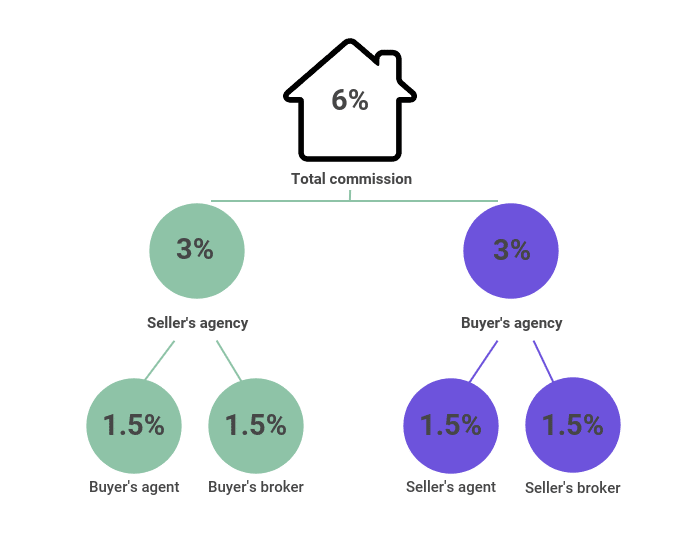
Published
Listing agent vs. selling agent | What is a listing agent? | How agents get paid | How to find a good agent | FAQs
A listing agent or seller’s agent markets homes on behalf of sellers and oversees every step in the home sale process.
Most homeowners who need to sell their home work with a listing agent. While hiring a listing agent isn’t cheap, the agent’s commission rate (2% – 3% of the home’s sale price) covers a wide range of services needed to sell your home.
Our guide breaks down the differences between a listing agent and selling agent, the key responsibilities of a listing agent, and how to find a good agent to sell your home.
Listing agent vs. selling agent
Real estate professionals and the general public often use different terminology to describe agents who assist buyers and sellers.
Most real estate agents can work as either a listing or selling agent in a real estate transaction. It’s important to understand the differences before hiring one.
A listing agent or seller’s agent represents the seller in a transaction. A listing agent helps sellers set a fair asking price, market the home for sale, host open houses, coordinate showings with prospective buyers, and negotiate contracts.
A selling agent represents the home buyer. Also known as a buyer’s agent, they help buyers get pre-approved for a mortgage, schedule and attend home showings, write offers, negotiate with listing agents, and set up home inspections.
A broker’s agent simply refers to any real estate agent who works for a broker. All real estate agents — whether they are a listing agent or a selling agent — are legally required to work under the license of a sponsoring broker.
What is a listing agent’s key responsibilities?

A listing agent or seller’s agent helps you sell your home as fast as possible, and for the best price.
To achieve a successful home sale, a good realtor usually completes the following tasks:
- Sets a fair, competitive listing or asking price
- Prepares your home for sale
- Posts your listing on the MLS and popular home search sites
- Markets your home for sale
- Reviews offers
- Negotiates price and terms in your favor
- Coordinates inspections, appraisals, and closing
We break down each listing agent responsibility in more detail below.
Price the home
To guide your pricing strategy, a good listing agent creates a comparative market analysis (CMA) report. A CMA is a home valuation based on the recent sales of comparable or similar homes in your area.
A good agent also prices your home to reflect current market conditions. For example, they might recommend you list your home slightly above its fair value in a market favoring sellers.
Prepare your home for sale
Part of a listing agent’s job is to help you get your home ready for photos, showings, and inspections.
At your initial listing interview, an experienced agent evaluates your home and recommends pre-listing work with the highest return on your investment.
For example, an agent can recommend you make certain repairs or improvements to increase your home’s value, or invest in home staging to improve your home’s showing appeal.
List on the MLS
Listing agents post your home on the multiple listing service (MLS): a platform most realtors use to market and sell properties.
Listing on the MLS also publishes your home on popular home search websites like Zillow, Realtor, and Trulia, getting it in front of more agents and potential buyers.
You can list on the MLS if you’re selling without an agent by using a flat-fee MLS service (for a one-time fee).
Market the home to buyers
A good realtor markets your home with professional photos, videos, and 3D tours, hosts open houses, and shares your listing on social media.
In a hot real estate market, extra efforts like staging and 3D tours of the home might not be necessary, but sometimes they help to get more eyeballs on your listing.
Review offers
It’s often hard to decide if an offer you’ve received is a good one. After all, offer price is just one factor to consider. A listing agent can help you carefully analyze each offer and decide whether or not to accept, counter, or decline.
A listing agent can also explain all of the important details about an offer, including contingencies and contract deadlines.
Negotiate contract terms
Good realtors are fierce negotiators and can help you get the best possible price and terms for your house, such as a faster closing date and fewer contingencies.
Coordinate inspections and closing
A listing agent is your main point of contact and communicates with all of the parties involved in the transaction to ensure a timely closing, including the buyer’s agent, title company, lenders, appraisers, and home inspectors.
» MORE: How to sell your home in 12 steps
How listing agents get paid
Listing agents earn a percentage of your home’s final sale price – but only get paid if your home sells. They generally charge between a 5% to 6% commission rate, split with the buyer’s agent.
For example, on the sale of a $500,000 home, a listing agent might charge you 6% in commission ($30,000). But the agent’s take home pay would be about 3% ($15,000), before splitting it with their broker.
Agent commission covers all of the costs of selling your house, including photography and videos, posting on the MLS, setting up a for-sale sign and lockbox, and marketing to buyers. The agent then recoups those costs when the house sells.

However, you don’t necessarily have to pay the full 5% to 6% commission rate. It’s possible to pay lower fees without sacrificing great service for a top local realtor.
Can a listing agent also work as a buyer’s agent?
A realtor can technically work as both a listing agent and a buyer’s agent in the same transaction.
Known as a dual agency agreement, the agent represents both the seller and the buyer – and earns a double commission paycheck at closing.
However, dual agency is considered risky because it’s hard for dual agents to remain neutral to both parties in the same deal. Given the potential conflicts of interest and confidentiality concerns, it’s best to avoid dual agency whenever possible.
Dual agency is currently illegal in Alaska, Colorado, Florida, Kansas, Oklahoma, Texas, Vermont, and Wyoming.
Can you change listing agents?
You can usually change realtors if you’re unhappy with your current one.
If you signed an exclusive right to sell agreement (the most common type), the legally binding contract gives your agent the exclusive right to represent you for the duration stipulated in your agreement (usually 3 to 6 months).
However, the listing agent might agree to terminate the agreement if you’re unhappy and want out. After all, keeping you locked into an agreement against your wishes could lead to a bad review and hurt the agent’s reputation.
» MORE: How to fire your real estate agent
How to find a good listing agent
With over 2 million licensed real estate agents in the U.S., it’s fairly easy to find a listing agent. But finding a good, experienced listing agent is often much more of a challenge. Here’s how to do it.
Use an agent matching service
Agent matching services can match you up quickly to top local agents and potentially save you thousands on realtor commission.
Provide your information and what you’re looking for in a listing agent, and then get matched up with realtors from local brokerages (at no cost).
There’s no obligation to use any agent you’re matched up with. At the very least, you can get some free advice from a local pro who knows your real estate market inside-and-out.
Ask family and friends for referrals
One of the most common ways to find a listing agent is to simply ask family, friends, or neighbors for referrals. These are people who can provide you with a trustworthy referral source.
However, there’s no guarantee of a good match. You still need to vet the agents carefully, reviewing each agent’s experience, sales history, and client reviews.
Find a listing agent at an open house
You can meet with local listing agents quickly by attending local open houses.
To get started, simply search for upcoming open houses on Zillow, and make plans to visit each home during the scheduled time.
But this strategy is hit-or-miss. You don’t know who you’ll be meeting with – a listing agent or a buyer’s agent – unless you call the brokerage ahead of time.
» LEARN MORE: How to find a good realtor
FAQs
Listing agent vs. selling agent: What's the difference?
A listing agent is a real estate agent who represents home sellers. Many real estate agents are open to representing either buyers or sellers, but some specialize in listing houses.
Not to be confused with the term seller's agent, a selling agent commonly refers to a realtor representing a home buyer.
Realtors can work as a listing agent and a seller's agent in the same transaction under what's known as a dual agency agreement. However, working with a dual agent carries numerous risks that should be carefully considered.
How does a listing agent get paid?
Listing agents get paid by collecting a percentage of the proceeds on a home sale, commonly known as a commission fee. The listing agent splits their commission with the buyer's agent and their brokerage.
Most listing agents charge approximately 3% in commission, but low commission real estate companies like Clever can connect home sellers with top local listing agents who charge half that amount.
What are a listing agent's responsibilities?
The listing agent is responsible for all of the tasks required to sell your house.
Half of their focus is on marketing your home, which involves setting a fair listing price through a comparative market analysis (CMA) report, taking photos or hiring a photographer, listing online, scheduling open houses, negotiating with interested buyers, and more.
Once offers have been submitted, your listing agent will help you choose the best one and negotiate terms, lock in a contract, and see the deal through to closing.
Related links
How to Find a Real Estate Agent: What You NEED to Know. A complete guide with expert tips for finding the best local real estate agents.
What is a Buyer’s Agent? A good buyer’s or selling agent does much more than just show you a few homes for sale and write up offers. Learn more about the key responsibilities of a buyer’s agent.
How to Sell Your House: The Ultimate Guide. Our guide breaks down the 12 steps to selling your house. We spoke to the experts to learn the best way to sell your home (with or without a listing agent).
What Companies Offer the Lowest Real Estate Commission Fees? Full-service real estate agents don’t have to cost full price. Check out our carefully selected list of the best low-commission real estate companies.
Redfin vs. Realtor: What Do You Really Get?: Explore the benefits of Redfin vs. traditional realtors, and the pros and cons of each, to find the best option for your next home sale.


Leave a Reply